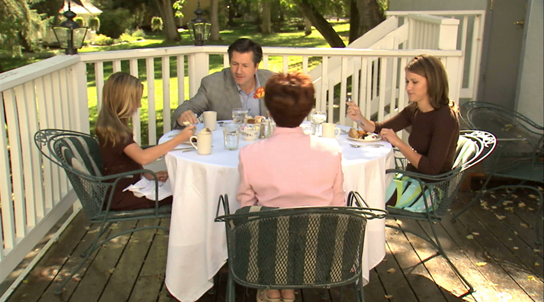With so much on our plate—the constant demands coming from our smart phone, computer, and social media—do we find ourselves distracted even when we’re with our kids? It’s so easy to do!
And thinking about ‘what’s next’ on the agenda (work, pediatric check-ups, dental appointments, meal preparation, housekeeping, problem-solving, dinner dates with partners) is an almost-constant drumbeat in most parents’ pressured minds.
I know this because, for a time, it became my own—in spite of the fact that I was raised by an astute father who quietly but powerfully believed that ‘family time’ was sacrosanct. His rule was that 90 minutes of every day would be dedicated to his family—absolutely without interruptions.
45 minutes of those precious minutes occurred during dinnertime. My entire family had to be home by 6:30 to eat dinner unless an emergency intervened.
As a family, during dinner we shared what had happened to each of us that day; what we were working on; and we ironed out problems and challenges. Our communal reckoning wasn’t serious or formal; it was casual and fun and helped us create eternally-unbreakable ‘fond bonds’ that tied us together as only ‘quality time’ with loved ones can.
One thing I learned during my formative years was the importance of shared experiences. Whenever I struggled with math, for example, my father didn’t appear impatient or disappointed in me. Instead, he shared his own story, saying, “I struggled with math, too. My tutor showed me how to solve a problem like this one”—and then he guided me through. In approaching my concern or problem in this way, he never made me feel inferior, so I eagerly embraced his confidence in me and watched, listened and practiced until I experienced the breakthrough myself.
After dinner, my parents spent another 30-40 minutes playing with me and my brother, reading a book with us, or helping us with math. They did nothing else during this time.
It was only after dedicated family time was over that they returned missed calls and caught up on other obligations while my brother and I played together just before bedtime.
Even when my father traveled, he let us know in advance so we wouldn’t be overly disappointed when dinnertime and after-dinner proceedings continued without him. Because of his thoughtfulness, we kids felt appreciated and respected. We could tell by his words and dedicated actions that we weren’t just an afterthought in his busy life.
On Saturdays, the dinnertime rules changed. We kids could dine with friends. My parents often dined out, too, so they could reconnect in ways that simply aren’t possible with children in tow.
The saddest part of our family history is that my father passed away when I was 18. But had he not been fully present to us in the many ways he was during our formative years, I may never have truly known him—or how to emulate his profound wisdom with my own children. Our precious, unrepeatable family time together is what forged my father’s everlasting legacy.
Alas! My wife and I, too, fell victim (for a while) to the whirlwind of activities that have become so much a part of today’s constantly-connected communications culture. But thanks to memories of my own prudent, practical family, we have long since rejected the disruptions that can so easily steal crucial family time. Today we play with our kids when we’re with them. We remain transparently focused on what’s happening right now when we’re together. We know (all too well) that if we don’t, they’ll fill their need for relationship in less wise ways: punching video games, seeking alliances with youngsters we may not know or approve of, and God only knows what else!






